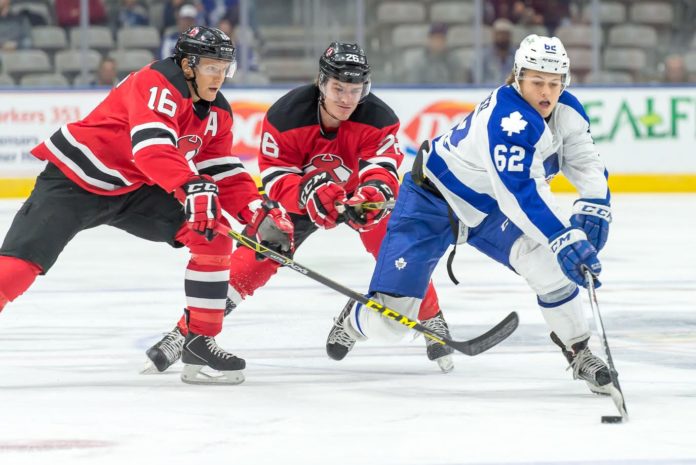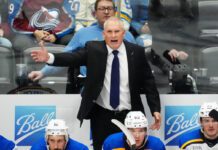
Head coach Sheldon Keefe stopped by the Bryan Hayes Show yesterday as his Toronto Marlies prepared for a Wednesday night game in Rochester.
Bryan Hayes: When you look back on that game on Saturday, as a coach in a 9-8 game, how do you approach the team? Are you happy with the result? Do you look for some positives, some negatives? I mean, that must have been just crazy on Saturday night.
Sheldon Keefe: It certainly was crazy. It was a night full of rollercoasters of emotion. We were up 3-1 after the first, and then down 6-4 after the second, and then 8-4 in the first 30 seconds of the third period. It was pretty crazy. We didn’t feel like we were playing great even when we were winning 3-1. We were trying to keep guys focused to have a good second period. It didn’t go that way. We lost our structure and didn’t get a lot of saves, and the game really got away on us. Suddenly, the puck started going in for us and they couldn’t get saves and they couldn’t do much right. Before you know it, we started to build momentum and the guys started to feel like they had something going and had a chance. To see the emotion swing back the other way was pretty great to watch, but not great to go through it from a coaching point of view. I think, by the end of it on the way off the bench after overtime, we couldn’t do a whole lot more other than laugh. It was something else.
Hayes: When you look back at the game time – not even necessarily a game like that but just any of the games throughout the season – as a coach, what’s your natural reaction? Is your natural focus to look for the negatives, or is it to look for the positives?
Keefe: I think, as a coach, you’re always trying to catch them doing it right. I think that’s something that the Leafs staff, Mike Babcock and everybody, right from the start of training camp was something that we focused on. All that said, you’ve got to try to make progress and get better. With that, you’ve got to make sure you’re tracking things that need improving and in that particular game there was a lot of it. We more try to just stick with our process and pretty much throw the result out; try to stick to the process and the things we want to do to try to get better day to day. We didn’t focus a whole lot on the structure of it; it was a really strange game. We tried to focus a little more on the individual play of each player, and see what kind of progress we can make with each guy. From a structure standpoint, it would be a very frustrating game to watch; watching the chances against and the goals and whatnot. When we left the game, my comment was, “we might want to get together with the other coaches in the AHL and start a movement to get smaller nets and bigger goalie equipment.” It was a strange night, but it’s a funny game. We’ve got a game here in Rochester [on Wednesday] and we expect it to be a lot lower scoring. The way these games usually come back, you play a 1-0 battle all the way through, so we’ll see how it goes.
Hayes: There’s a lot of focus on William Nylander for obvious reasons. The stats – he’s top three or four in points. He’s obviously putting up very good numbers offensively, but there’s always been a focus throughout the organization to make sure his overall game continues to evolve and continues to improve. How has Nylander grown as an overall player over the course of the first two months?
Keefe: He’s taken strides. We’ve seen progress, and that’s been positive. Willy is a guy that spends a lot of time working on his game from a skill point of view. He continues to get better there. You see him trying new things before and after practice, and just working on the details of his game. Certainly our coaching staff and the development staff of the Leafs have worked on him with that. The finer details of the game in particular, stuff without the puck, there’s room for growth. He’s still adjusting to playing center for the first time in North America and the responsibilities that come with being away from the puck and being strong positionally, and managing the puck and managing your shift; things like that. We work with him closely on it and he watches a lot of video on his own. I certainly spend a lot of time with him as well. He sees it; he recognizes it. From my end of things, it’s been steady progress and you see him making good decisions in staying below the puck and being in good spots and being a little more competitive when we don’t have the puck so we can assure we get it quicker and get out of our zone and get him playing to his strengths on offence. The skillset is obvious. You see where he is at such a young age – among the scoring leaders, among much older, more experienced players. That speaks to the talent level. We’ll continue to make progress with him and make sure he’s continuing to get better and prepared for when he becomes an NHL player.
Hayes: There’s been a lot of turnover, top to bottom, in the organization — Mike Babcock, yourself, Lou Lamoriello in the last year and a half… Brendan Shanahan. Yet, you look at the roster with the Marlies, and there are a few players with the Marlies who have been with the organization for quite some time and were brought in by your predecessors — guys like Josh Leivo, even a guy like Frederik Gauthier. When you took over the gig, how important was it to let those older players, or the players who have been in the organization for more than a year and a half, know that they know they’re playing on an even playing field? That they’re looked upon the same way a guy like Nylander is looked upon?
Keefe: I think that’s all part of managing day to day. I’ve been very fortunate to have Gord Dineen here on staff with us. Obviously, he’s got a lot of experience and relationships with those players who have been here and also knows how things have gone in the past. That experience has been very valuable for me, especially coming in as a first year coach in the league; not just in the organization, but in the league and at the level of professional hockey. I lean on Gord a great deal. Those guys have also been good pros. Any of those guys you mentioned that have been around, they recognize that things are different, and there’s a lot of focus obviously on the Nylanders of the world and whatnot, but we try to keep everybody engaged and recognizing that there’s opportunities for everyone. The Leafs are looking for good players, and I think you look at a guy like Byron Froese – with the Marlies last year, coming in from off the radar if you will, and just worked hard every day and did things right and found his way into an NHL job and is doing great things with the Leafs here now. We’re certainly not expecting him to be back with us any time soon with his efforts. There’s lots of good examples like that, I think, that motivate our players every day, and they recognize that we’re trying to create that culture around here that’s going to mirror what’s happening with the Leafs and something that, if and when they get the call, they’re prepared to make the transition pretty well and be set up for success. We’re fortunate to see the success that Byron has had with the Leafs, and hopefully what we’re doing with the Marlies put him in a good spot to be able to do that.





























![New Leaf Anthony Stolarz on the opportunity in Toronto: “In Florida, I knew my role as a backup… Now, [Joseph Woll] and I are competing for starts… As a goalie, that’s all you can ask for” Anthony Stolarz, Stanley Cup win, now Maple Leaf](https://mapleleafshotstove.com/wp-content/uploads/2024/07/anthony-stolarz-sc-100x70.jpg)
